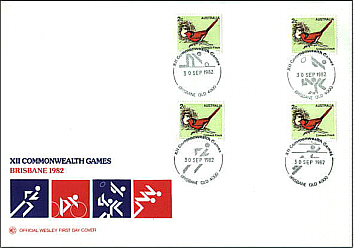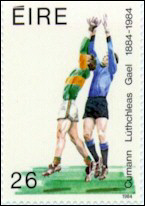|
|
|
International
Football |
|
Despite being
restricted in its appeal overseas Australian Football has not been backward in
etching out an international presence. One less well known way has been by
publicity at
International Stamp Shows
held in Australia. For example it would surprise most Australians, even diehard
Aussie Rules Fans, that the second and third stamps issued with Australian
Football as the theme were both issued overseas. More conventional ways are the
following.
Demonstration
Games at Major Events
A game of Australian Rules was
played at the MCG during the 1956 Olympics and the VFL/AFL have gone out of
their way to schedule games at the same time as the Formula One Grand Prix and
the Gold Coast Indy car race.
In 1982 the Grand Final between
Richmond and Carlton was replayed at the Gabba as an official Demonstration
sport of the XII Commonwealth Games. The ground was a sell out and patrons saw
Richmond reverse the tables defeating the Blues by 18 points, Richmond 28.16.184
defeated Carlton 26.10.166.
A
Cinderella stamp sheet was issued which
included an
Australian Rules Stamp. Below is a
Wesley Cover with Australian Rules Logo and Postmark (PM 959) It was also
released as a
smaller cover.
A series of maxicards for each sport including
Australian Football
were also issued.
A
Postcard
with the
Australian Rules Postmark on the
back cover
was also released. |
|

|
|
Peter Daicos did a lap of honour with the 2002
Manchester
Commonwealth Games Baton
at half time in the Anzac Day Blockbuster at the MCG on
25th April 2002.
A cover by First Class Collectibles was
released to commemorate the event.
The
Centenary of Federation in 2001 was
celebrated with two special Federation Matches. |
|
Demonstration Games Overseas.
Demonstration games, usually as part of
end of season trips, have been played in many countries, including Japan,
Canada, USA, U.K., New Zealand, Greece and South Africa. 1998 was the
first year that official preseason games in the Ansett Cup have been played. In
South Africa Brisbane defeated Fremantle and in New Zealand., Melbourne defeated
Sydney. In 2000 The Western Bulldogs defeated Hawthorn , and in 2001 the Lions
defeated Adelaide both in Wellington, NZ.
For further information see the
International Games Venues.
International Cup
Leagues are present in New Zealand, USA, Canada, several Asian countries,
including Japan, Singapore and Vietnam and several European countries including
the UK and Denmark. The only other country in which Australian Football is the
main sport is in the tiny Pacific country of Nauru.
From 14-23 August 2002 the inaugural Australian
Football International Cup was staged in Melbourne, Australia. The following 11
nations competed - South Africa, the USA, Canada, England, Denmark, Ireland,
Japan, Nauru, New Zealand, Papua New Guinea and Samoa.
Ireland won 7.9 (51) to PNG 2.7 (19) in the Final
at the MCG.
The next Cup was planed for 2005.
|
Gaelic Football
Watching Gaelic and Australian Football,
there is little doubt that the games are similar. One theory as to the origin of
Australian Football was that it evolved from Gaelic Football. Research by
Professor Blainey appears to discredit this, and perhaps both games have evolved
along similar lines. Other researches however feel they are intricately linked
The Centenary of the Gaelic
Athletic Association was marked by the issuing of two stamps on 23/08/84. The
stamp showing Gaelic Football is shown at right.
The similarity between the games has led to
International Rules Football |
 |
|
The Irish Experiment
Several young footballers have been
brought over from Ireland to try out for Australian Football and this has been
dubbed "The Irish Experiment." Of the group, Jim Stynes, with the 1991 Brownlow
medal, 4 Best and Fairest for Melbourne, 264 games and the record for the
longest number of consecutive games 244, has been the outstanding player.
However Sean Wight (89), Brian Stynes (2), Dermott McNicholl (3) and Paul Early
(1) have all played senior games.
With the advent of rookie lists clubs were
more prepared to put their toe in the water and in 2001 Melbourne drafted Kevin Devine,
the Swans drafted Tadhg Kennelly and the Western Bulldogs drafted Bernie
Collins.
Bernie
Collins was retained on the rookie list at the Bulldogs for 2002 but then
delisted. Kevin Devine was delisted by Melbourne after one season. Nicholas Walsh was added to Melbourne's
rookie list for 2002 and 2003. The Swans added Declan O'Mahoney from Dublin to
their 2003 Rookie List but he was delisted at the end
of 2003.
Tadhg Kennelly proved to be a huge success story and he played 8 senior games
off the rookie list in 2001 For the 2002 season he was elevated to the senior
list. Kennelly played ever game for the swans in 2002 lifting his game total to
28.
After round 19 he received a Rising Star Nomination. In 2005
he was a member of the Swans Premiership side and his game total has advanced to
101*.
The surprise rookie of
2004 was Setanta O'hAilpin, a champion junior hurler, who was placed on the
Carlton Rookie List. Midseason he was upgraded to the senior list but missed
senior selection after sustaining injury. He was again a rookie for 2005 and was
again upgraded and played 1 senior game. He was placed on the senior list for
2006. His brother, Setanta O'hAilpin was also added
to Carlton's Rookie list for 2005 and 2006. The
Brisbane Lions upset GAA officials by adding Colin Begley and Brendan Quigley to
their rookie list for 2006. |
|
The Arafura Games
The Arafura Sports Festival was first held in Darwin in 1991. It is a
celebration of sport and includes 1,400 athletes from surrounding countries such
as PNG, Indonesia, Philippines, Thailand, Hong Kong, Brunei, Malaysia, Sabah,
Sarawack as well as teams from the Northern Territory and North Queensland.
The initial games included a demonstration of Australian
Football. The game was played on 22nd May and was between the NT Teal Cup Team
and a team of NT senior Footballers from the NTFL, Bathurst Island and Barrunga
Community. It included such champions as Maurice Rioli and Noel Long.
Australia Post issued a special commemorative
cover and postmark (PM 1715) to
celebrate the festival . The left side of the cover shows the logos of the
sports played, including Australian Football. (
enlarged logo)
In more recent years, Australian
Football games have been played between the International competing countries
with PNG winning in 1995 and Singapore in 1997.
1999 saw teams split into two divisions with
Division A containing Papua New Guinea , Hong Kong, Japan and the Northern
Territory and Division B containing New Zealand, Singapore, Samoa, and Western
Australia. The final saw Papua New Guinea defeating New Zealand by 37 points
with Samoa winning the Bronze medal.
The 2001 Games were held from the 19-26 May 2001. Nauru won the final from
the Central Desert Eagles, with the NT superules team winning the bronze.
|
|
|
|
|